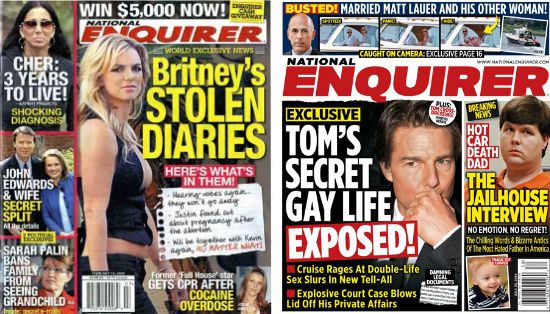I’ve developed a newfound respect for Cher and Tom Cruise, Britney Spears, Branjelina, and Ben Affleck — for all of the celebrities regularly targeted and attacked by the National Enquirer. That infamous gossip rag, it turns out, isn’t just in the business of digging up and reporting celebrity gossip. It’s also in the business of digging up and then reburying celebrity gossip — something not entirely unlike what might be described as celebrity blackmail.
Say you discover some scandalously juicy tidbit about a famous actor or musician. You can publish that information, selling copies of your tabloid and making money off newsstand sales and advertising. Or you can take a different approach. You can confront that famous person in private and ask what it’s worth to them to keep this information from ever being made public. Maybe that’s worth a favor — the promise of an exclusive interview, perhaps. Or maybe, more crudely, some kind of direct financial exchange can be arranged.
The precise nature of the National Enquirer’s side-business of burying potentially damaging stories isn’t entirely clear, but this service is apparently something the rag has long performed for select clients. And, also quite likely, it’s something the Enquirer has long done to other select individuals who may have not so much been clients as victims.
Diana Moskovitz explains how this worked:
The New York Times reported [August 23] that David Pecker, chairman of American Media Inc., which publishes the National Enquirer, has been granted immunity by the federal prosecutors investigating whether the president funneled hush money to women with whom he had affairs. Here’s how that worked, according to prosecutors: The unnamed chairman and chief executive of a company that owns a “popular tabloid magazine” would let Donald Trump’s former attorney, Michael Cohen, know about any negative stories that came up about Trump’s “relationships with women.” When those stories did come up, they would be “purchased and their publication avoided,” prosecutors said, adding that during the campaign, Cohen arranged “for the purchase of two stories so as to suppress them and prevent them from influencing the election.”
This, naturally, has led to a lot of talk about what exactly the Enquirer has on Trump and if it will be given to the government. But it’s worth recalling that what the Enquirer did for Trump — dubbed “catch and kill” because the story is prevented from getting published — isn’t new or novel for the publication. It’s been carrying out various versions of the scheme for years and for plenty of other famous and powerful people.
Moskovitz goes on to discuss several other infamous celebrities whom the Enquirer apparently assisted with its “catch and kill” service, including Arnold Schwarzeneggar, Bill Cosby, Tiger Woods, and Harvey Weinstein. All of those men, like Trump, got themselves in trouble in just the sort of titillating, lascivious scandals that gossip magazines thrive from publishing. But instead of piling on with additional salacious (or invented) details, the way the Enquirer usually does in cases of celebrity scandal, the tabloid helped to provide as much of a positive spin as was possible for those men.
It’s entirely possible the rag did the same thing on behalf of other wealthy clients with greater success — meaning that they helped to completely bury scandals the public has never heard about. But there’s at least one group that we can be sure has not availed themselves of this secret-keeping service, and that’s the set of celebrities the gossip rag routinely attacks on its cover, with unflattering, photoshopped pictures and lurid headlines. Hence my new respect for Cher, Cruise, Brittney, et. al.

The news that Pecker is now cooperating with federal prosecutors raises the possibility, as Moskovitz puts it, that “Maybe, just maybe, this thread federal prosecutors are pulling on will lead to more people than just the man in the White House.” Additional clients of the Enquirer’s “catch and kill” service may be exposed. We may also learn the names and secrets of less-willing participants in this program — those who were being essentially blackmailed by Pecker’s outfit.
Because, again, there seems to be a very fine line between “catch and kill” and simple blackmail. It’s the fuzzy distinction, I suppose, between “We’ll do this favor for you and then, someday, maybe you can do a favor for us in return” and “Do us a favor in return or else we will go public with this story.” Trump apparently viewed his arrangement as more like the former, but it’s also possible that it was really more like the latter, but he just wasn’t self-aware enough to notice that.
In either case, all of this — like the rest of the news about Trump’s orchestrating hush-money payments to his mistresses — shows that we have a president who is extremely susceptible to blackmail. Trump’s defense against that charge is that he has personally insured that all of his blackmail payments are up-to-date, and that he only uses the classiest high-end concierge blackmail services. That may be true, but it misses the point of the problem here.
The bottom line, as always, is that today would be an excellent day for you to talk to the manager of your local supermarket. Politely request that they stop disrespecting you and all of their other customers by shoving the lurid dishonest of the National Enquirer in everyone’s faces at the checkout counter.












